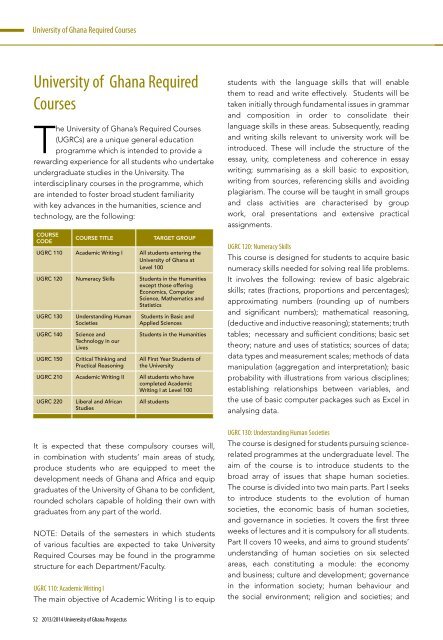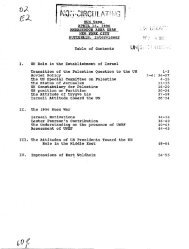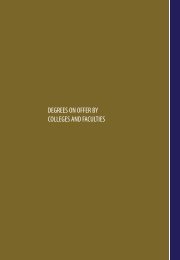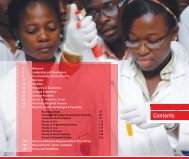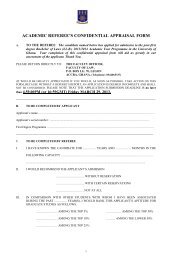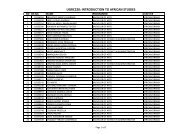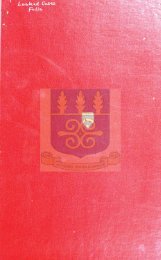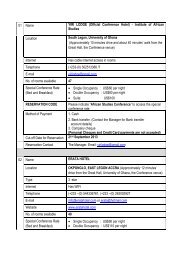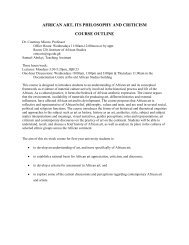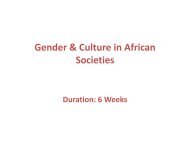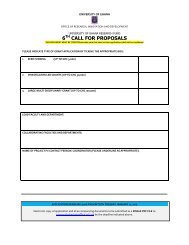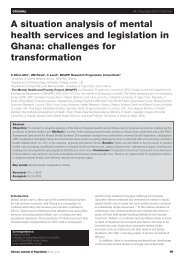General Pages - University of Ghana
General Pages - University of Ghana
General Pages - University of Ghana
Create successful ePaper yourself
Turn your PDF publications into a flip-book with our unique Google optimized e-Paper software.
<strong>University</strong> <strong>of</strong> <strong>Ghana</strong> Required Courses<br />
<strong>University</strong> <strong>of</strong> <strong>Ghana</strong> Required<br />
Courses<br />
The <strong>University</strong> <strong>of</strong> <strong>Ghana</strong>’s Required Courses<br />
(UGRCs) are a unique general education<br />
programme which is intended to provide a<br />
rewarding experience for all students who undertake<br />
undergraduate studies in the <strong>University</strong>. The<br />
interdisciplinary courses in the programme, which<br />
are intended to foster broad student familiarity<br />
with key advances in the humanities, science and<br />
technology, are the following:<br />
COURSE<br />
CODE<br />
COURSE TITLE<br />
TARGET GROUP<br />
UGRC 110 Academic Writing I All students entering the<br />
<strong>University</strong> <strong>of</strong> <strong>Ghana</strong> at<br />
Level 100<br />
UGRC 120 Numeracy Skills Students in the Humanities<br />
except those <strong>of</strong>fering<br />
Economics, Computer<br />
Science, Mathematics and<br />
Statistics<br />
UGRC 130<br />
UGRC 140<br />
UGRC 150<br />
Understanding Human<br />
Societies<br />
Science and<br />
Technology in our<br />
Lives<br />
Critical Thinking and<br />
Practical Reasoning<br />
Students in Basic and<br />
Applied Sciences<br />
Students in the Humanities<br />
All First Year Students <strong>of</strong><br />
the <strong>University</strong><br />
UGRC 210 Academic Writing II All students who have<br />
completed Academic<br />
Writing I at Level 100<br />
UGRC 220<br />
Liberal and African<br />
Studies<br />
All students<br />
It is expected that these compulsory courses will,<br />
in combination with students’ main areas <strong>of</strong> study,<br />
produce students who are equipped to meet the<br />
development needs <strong>of</strong> <strong>Ghana</strong> and Africa and equip<br />
graduates <strong>of</strong> the <strong>University</strong> <strong>of</strong> <strong>Ghana</strong> to be confident,<br />
rounded scholars capable <strong>of</strong> holding their own with<br />
graduates from any part <strong>of</strong> the world.<br />
NOTE: Details <strong>of</strong> the semesters in which students<br />
<strong>of</strong> various faculties are expected to take <strong>University</strong><br />
Required Courses may be found in the programme<br />
structure for each Department/Faculty.<br />
UGRC 110: Academic Writing I<br />
The main objective <strong>of</strong> Academic Writing I is to equip<br />
students with the language skills that will enable<br />
them to read and write effectively. Students will be<br />
taken initially through fundamental issues in grammar<br />
and composition in order to consolidate their<br />
language skills in these areas. Subsequently, reading<br />
and writing skills relevant to university work will be<br />
introduced. These will include the structure <strong>of</strong> the<br />
essay, unity, completeness and coherence in essay<br />
writing; summarising as a skill basic to exposition,<br />
writing from sources, referencing skills and avoiding<br />
plagiarism. The course will be taught in small groups<br />
and class activities are characterised by group<br />
work, oral presentations and extensive practical<br />
assignments.<br />
UGRC 120: Numeracy Skills<br />
This course is designed for students to acquire basic<br />
numeracy skills needed for solving real life problems.<br />
It involves the following: review <strong>of</strong> basic algebraic<br />
skills; rates (fractions, proportions and percentages);<br />
approximating numbers (rounding up <strong>of</strong> numbers<br />
and significant numbers); mathematical reasoning,<br />
(deductive and inductive reasoning); statements; truth<br />
tables; necessary and sufficient conditions; basic set<br />
theory; nature and uses <strong>of</strong> statistics; sources <strong>of</strong> data;<br />
data types and measurement scales; methods <strong>of</strong> data<br />
manipulation (aggregation and interpretation); basic<br />
probability with illustrations from various disciplines;<br />
establishing relationships between variables, and<br />
the use <strong>of</strong> basic computer packages such as Excel in<br />
analysing data.<br />
UGRC 130: Understanding Human Societies<br />
The course is designed for students pursuing sciencerelated<br />
programmes at the undergraduate level. The<br />
aim <strong>of</strong> the course is to introduce students to the<br />
broad array <strong>of</strong> issues that shape human societies.<br />
The course is divided into two main parts. Part I seeks<br />
to introduce students to the evolution <strong>of</strong> human<br />
societies, the economic basis <strong>of</strong> human societies,<br />
and governance in societies. It covers the first three<br />
weeks <strong>of</strong> lectures and it is compulsory for all students.<br />
Part II covers 10 weeks, and aims to ground students’<br />
understanding <strong>of</strong> human societies on six selected<br />
areas, each constituting a module: the economy<br />
and business; culture and development; governance<br />
in the information society; human behaviour and<br />
the social environment; religion and societies; and<br />
52 2013/2014 Univeresity <strong>of</strong> <strong>Ghana</strong> Prospectus


